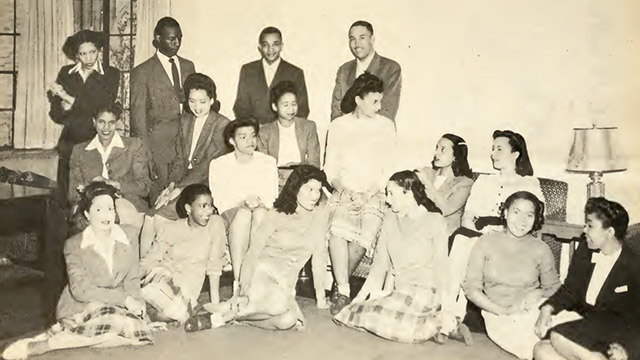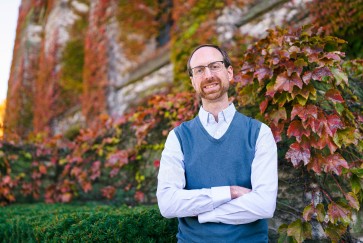As Archivist for the Black Experience, it is Charla Wilson’s job to help explore and preserve the stories of Black lives at Northwestern, from the first known students of color to the Black students, faculty and alumni currently working to shape the University community.
Northwestern Now talks with Wilson about how history is essential to understanding and addressing the racial inequity that persists today.
What do we mean when we talk about the Black experience at Northwestern?
Since 2017, I have had the privilege of working with the Northwestern community to preserve records that document our institution’s Black history. The Archivist for the Black Experience position was developed in partnership between the University and its Black alumni following a student protest in 2015. Students and alumni advocated for this dedicated work to build an archive that serves as a physical reminder of Northwestern's past and holds us accountable for knowing it.
The Black experience is multifaceted and inspiring.
Just to offer a few names, there is Daniel Hale Williams, who conducted the first successful open-heart surgery. There is Jeff Donaldson, who shaped the Black Arts Movement as a co-founder of AfriCOBRA and as a contributor to the Wall of Respect. These are names we are likely familiar with, so an essential aspect of my work is also identifying where gaps might exist in our records so we can be better informed about various perspectives and experiences in our institution's Black history.
The takeover of the Bursar's Office advanced the fight for open housing in Evanston in 1968, the year of Martin Luther King Jr.'s assassination and the passage of the Fair Housing Act. A culminating point in the nation's history — as well as the University's — the fight for fair housing started long before. When does the fair housing fight begin at Northwestern?
Yes, there was a fight for fair housing in Evanston, as there was across the nation. Black students also struggled to secure on-campus housing without racial restrictions. A notable example is the story of Isabella Ellis, who enrolled at Northwestern in 1902. There was opposition to her living at Chapin Hall when 12 white occupants threatened to withdraw from the University if it meant sharing a room with Ellis. At the time, roommates were required due to limited housing availability. The housing administration allowed Ellis to live alone in a double for a year. However, when she applied for housing the following year, they denied her request.
Since Ellis was unable to find alternative accommodations, she withdrew from the University. While staff posed opposition, the decision remained. Ellis' story received media attention, especially in the Black press. It also set a precedent that allowed for housing discrimination. Black students found alternatives to on-campus housing, including living with Black families in Evanston, commuting to campus and living at the Emerson Street YMCA (a Y for African Americans). Still, throughout the early 20th century, Black students advocated for open housing without racial restrictions and were successful.
Black student organizations have had an enormous impact on the Black experience as well as the larger Northwestern community. For Members Only, the University's premier Black student alliance, is part of a long tradition of political engagement by Black students at Northwestern. Could you trace its roots?
There was a precursor to For Members Only (FMO), and that was the Quibbler's Club, founded in 1926 as an integrated group, which organized social gatherings, lectures and sponsored Negro History Week (Black History Month). By the 1940s, they shifted their focus to advocating for integrating all campus activities and housing without racial restrictions. In 1946, when the student body was surveyed on the issue of open housing, 72% were opposed to integrated on-campus housing, and 67% were in favor of international houses, where Black students were giving the option of living starting in 1947.
The full integration that the Quibblers advocated for and desired did not come into being until 1953 when Northwestern established an open dorm policy. Like the Quibblers who came before them, FMO also started out as a social group founded by Herman Cage in 1967. However, very quickly it adopted a political mission to address discrimination and the unique challenges Black students faced at a predominately white institution. They ultimately led a takeover of the Bursar’s Office and successfully secured the University's commitment to usher in new practices for fostering diversity and inclusion.
Black students who founded these groups — and subsequent generations who joined them — may have found existing student organizations unwelcoming and even hostile, leading to the creation of spaces by Black students for Black students. What student-founded organizations emerged to celebrate Black history, art and culture?
Black students formed organizations, both on or off-campus, that provided them their own space and to celebrate Black history and culture. A great example of this is the ingenuity of Eileen Cherry-Chandler. In 1970, she had a charge in FMO to create opportunities for Black students to engage in the cultural arts.
Cherry-Chandler saw that there was a lack of opportunities for Black students in the existing organizations. She was influenced by the political climate, namely the Black Arts Movement, which promoted Black artists to create art that celebrated the Black aesthetic and Black consciousness (political engagement). She was inspired to form various groups, including a dance and jazz troupe, Black Folks Theatre, the Northwestern Community Ensemble, and "The Ritual," including performances during the annual Black student orientation.
This May 8 marks the 50th anniversary of the choral group Northwestern Community Ensemble (NCE), which Cherry-Chandler founded with fellow classmates, L. Stanley Davis and Clifton Gerring III. NCE was created as a music ministry in the Black sacred music tradition.
How can the larger Northwestern community engage with Black history, not only for Black History Month, but as part of an ongoing conversation to address issues of diversity, equity and inclusion?
If you’re looking for more ways to learn Northwestern history, University Archives offers two new audio tours with virtual and in-person options. Check out the Black Student Experience at Northwestern University and Walking Through Northwestern History.


